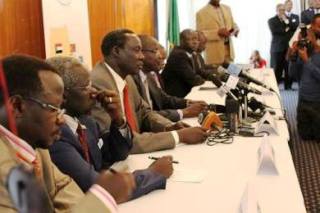Former SPLM detainees excluded from S. Sudan peace talks
By Tesfa-Alem Tekle
April 7, 2014 (ADDIS ABABA) – The Inter Governmental Authority on Development (IGAD), the regional bloc mediating between the South Sudan’s warring parties, has suspended the participation of the seven non-aligned members of the ruling SPLM.

The meeting also attempted to launch a “leadership review” within the SPLM, which has been severely divided by the conflict which began in December pitting rebels – consisting of defected soldiers and armed civilians – led by former vice-president, Riek Machar, against president Salva Kiir’s government.
The internal SPLM reconciliation forum, facilitated by IGAD, Ethiopia’s ruling party and South Africa will prepare the ground for a SPLM “leadership review and self-assessment forum”.
“I am convinced that once the SPLM party dispute is resolved, the national problems by and large will be resolved,” the Ethiopian prime minister said.
“We will remain firm to see to it that this intra-party dialogue results in fruitful outcomes,” he added.
Desalegn said the two sides must negotiate and bring peace to South Sudan, adding that the talks cannot be further delayed because of the seven members of the SPLM who want to attend the talks as a third party.
The ‘SPLM 7’ were initially arrested and accused of being part of an alleged coup attempt led by Machar. All of the accused deny the allegations and the group of seven were released to Kenya in late January at IGAD’s request.
However, rather than joining Machar’s SPLM/A-in-Opposition the group said that as they were not part of the armed conflict they would attend the talks as a third party. This is one of the reasons for the peace process stalling following a weak ceasefire deal signed on 23 January.
The agreement has been largely ignored by both sides and the conflict, which has displaced over a million people and killed thousands.
Desalegn said IGAD was looking to use a similar model to the 2005 Comprehensive Peace Agreement (CPA) that ended the conflict between Sudan and South Sudan.
Any peace deal reached at the current negotiations will be the basis of future governance and law making, he said.
“I would like to urge you to move from the existing arrangement and conform to the realities by making internal self-assessment, critically,” Desalegn told members of the SPLM political bureau on Saturday.
“The destiny of South Sudan up to now is in the hands of SPLM and its leadership and its members. Hence the party dispute is at the heart of the current crisis and its resolution is cardinal to addressing national governance issues that will eventually transform the country and the people of South Sudan for prosperity,” he stressed.
Despite their current exclusion, an IGAD official told Sudan Tribune that the SPLM 7 may be allowed to join the final stage of the peace talks when the two sides are close to signing a peace agreement.
IGAD have given the two warring parties two weeks before the new round of talks resumes on 22 April without the SPLM 7.
Rebel spokesperson Yohanis Musa told Sudan Tribune that Machar’s negotiating team was not consulted or involved in IGAD’s decision.
“The government side insisted to exclusion of the SPLM 7 and IGAD took their case seriously and came to decision to suspend their participation,” said Musa.
IGAD had previously backed an all-inclusive peace process, including the participation of the SPLM 7, as well as the four political detainees under trial in Juba and the wider civil society.
Last week, IGAD rejected an agreement between the two SPLM factions to sign a Declaration of Principles and agenda for the negotiations, arguing that the arrangement excluded the group of seven former political prisoners.
Another member of the rebel negotiating team, who preferred anonymity, accused IGAD of allegedly taking the government’s side.
(ST)
